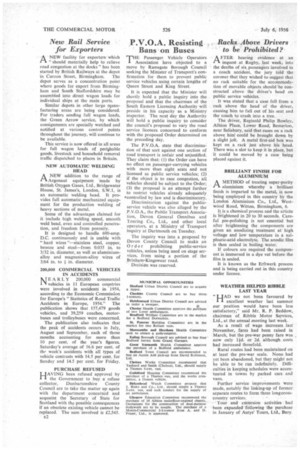Racks,. Above Drivers to be Prohibited?
Page 50

If you've noticed an error in this article please click here to report it so we can fix it.
AFTER. hearing evidence at an inquest at Rugby, last week, into the deaths of six. passengers involved in a coach accident, the jury told the coroner that they wished to suggest that no rack suitable for the accommodation of movable objects should' be constructed above the driver's head on public service vehicles.
It was stated that a case fell from a rack above the head of the driver, causing him to fall out of his seat and the coach to crash into a tree.
The driver, Reginald Philip Rowley. Albion Place, Lower Road, Bemerton. near Salisbury, said that cases on a rack above him' could be brought down by a slight jolt. A metal first-aid box was kept on a rack just above his head. There was a slot to keep it in place, but it could be moved by a case being placed against it.
BRILLIANT FINISH FOR ALUMINIUM
A METHOD of treating super-purity 4-1 aluminium whereby a brilliant finish is imparted to the metal, is now being employed in this country by the London Aluminium Co., Ltd., Westwood Road, Witton, Birmingham, 6.
It is a chemical process and the article is brightened in 20 to 30 seconds. Careful pre-polishing is not essential but after brightening the components are given an anodizing treatment at high voltage and low temperature in a sulphuric-acid electrolyte. The anodic film is then sealed in boiling water.
If colours are required the component is immersed in a dye vat before the film is sealed.
It is known as the Erftwerk process and is being carried out in this country under licence.
WEATHER HELPED RIBBLE LAST YEAR
" HAD we not been favoured by
excellent weather last summer our position would have been less satisfactory," said Mr. R. P. Beddow, chairman of Ribble Motor Services, Ltd., at the annual meeting last week.
As a result of wage increases last November, fares had been raised in March, but the pre-war penny fare was now only lid. or 2d. although costs had increased threefold.
Rural routes had been maintained on at least the pre-war scale. None had yet been abandoned, but they might not be able to be run indefinitely. Difficulties in keeping schedules were accentuated in towns by parked cars and vans.
Further service improvements were made, notably the linking-up of former separate routes to form three long crosscountry services.
Tour and excursion activities had been expanded following the purchase in January of Autys' Tours, Ltd., Bury.
























































































































